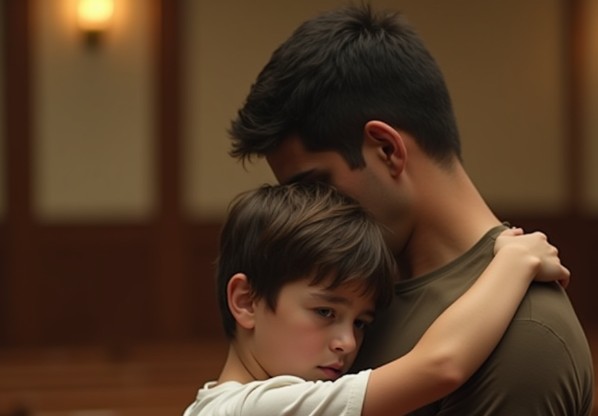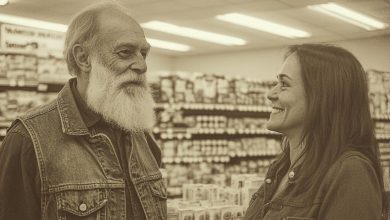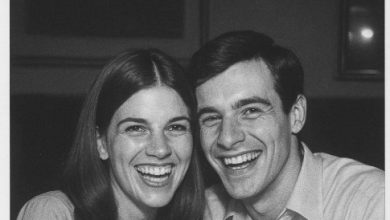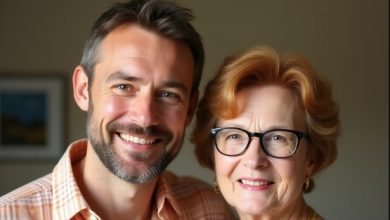My Aunt Waged a Custody War Over My Brother—But I Was Aware of Her Hidden Intentions

The morning after we laid Mom and Dad to rest, I felt the weight of the world shift onto my shoulders. I didn’t wake up as an adult because my birthday had come around—it was the day after, and it was more than a date on a calendar that changed me. It was because someone out there was already plotting to take away the only family I had left. And I was determined not to let that happen.
At eighteen years old, I thought I had my life ahead of me—college, friends, freedom. But I never imagined that I’d be standing at my parents’ graveside, holding my little brother, Max, who was just six, and watching the tears roll down his cheeks. He still believed that our mother was on a long trip and that she would come home any day now. And every time he asked, “When will Mommy be back?” my heart broke a little more.
The funeral fell on my eighteenth birthday. People walked up to me in their black suits and whispered, “Happy birthday,” as if it was something to celebrate. It wasn’t. I didn’t want a cake. I didn’t want presents. All I wanted was to stop the questions in Max’s eyes.
We stood there in our mourning clothes, the wind tugging at the sleeve of my jacket, and I knelt beside the fresh mound of earth. I promised him, “I’ll never let anyone take you away. You’re my brother, and I’ll protect you forever.” It was a vow I made with trembling lips, not knowing how I would keep it, but knowing I had to try.
That vow was tested faster than I could have foreseen.
A week after the funeral, Aunt Diane and Uncle Gary invited us over for cocoa. They sat us at their shiny kitchen table, the one with the polished wood and the matching chairs. Max was busy decorating his dinosaur stickers, and I felt their eyes on me—pity mixed with something else. Diane reached out and patted my arm, saying, “We know this is hard, honey, but you’re still so young. A child. You need to think about what’s best for your brother.”
“Max needs a steady home,” Gary chimed in, “not this chaos.” Their words felt rehearsed, like a play they’d been practicing. They’d forgotten Max’s birthday three years in a row. They skipped Thanksgiving to go on a cruise once. And now they spoke of routine and stability?
I clenched my jaw until my teeth hurt. I wanted to ask them why they hadn’t cared before, but I just nodded, because arguing wouldn’t help. Deep down, I sensed that their concern was not truly about Max’s well-being—it was a plan.
The next morning, I learned they had filed for custody. They wanted legal control over Max. It hit me like a blow. This wasn’t genuine care—it was a strategy to get whatever they could from our family. I felt a cold anger rise in me. They didn’t want Max because they loved him; they wanted something else, and I was going to find out what.
I marched into the college office that same day and withdrew from my classes. The clerk asked if I was certain, and I cut her off with a firm “Yes.” Education could wait. My brother couldn’t.
From that moment on, I worked two jobs. During the day, I served customers at a fast-food restaurant, plastering a smile on my face even when people snapped at me. At night, I cleaned law offices, mopping floors and emptying trash cans. It stung with irony—cleaning places where legal fights might happen, while I was gearing up for one of my own.
We left our family home. The bills were too high now that only my part-time paychecks were coming in. So, Max and I moved into a tiny studio apartment that smelled of stale takeout and cleaning chemicals. The mattress pressed against one wall, the futon against the other. But that small room was ours, and I watched Max spread his toys on the floor with a proud grin.
“It’s small, but it’s cozy,” he said one night, wrapping himself like a little burrito in a blanket. “It smells a bit like pizza—and home.” His words struck me in the chest. They made me think I could do this—that no matter how hard it got, I’d keep going for him.
I filed the papers to become his legal guardian. I knew being eighteen was young, and the odds were against me. But so what? I had love and determination, and that counted for something.
Then one morning, the world tilted again.
I stared at the report from Child Protective Services in disbelief. Aunt Diane had called them. I read her accusations: that I left Max alone, that I shouted at him, that I’d even hit him. My chest constricted. There was no way I could defend myself—or so it felt. I saw Max’s face: the way he laughed when I made silly faces, how he curled up close when the thunder boomed. I would never harm him.
The social worker shifted her eyes away and murmured, “She says you’re unfit, that the court should consider changing guardianship.” It all sounded like a cruel joke. But Diane’s words had planted a seed of doubt.
I asked if there was anyone who could vouch for me. They mentioned our neighbor, Ms. Harper—a retired third-grade teacher who let Max spend afternoons on her porch swing while I worked. I remembered her gentle smile and the way she always brought over a plate of cookies.
Court day arrived. I wore my only clean shirt, and Max held my hand so tight his little fingers were white. Across the room, Diane sat with her necklace and her tin of cookies, smiling as if she’d baked them herself. Ms. Harper stepped up for her testimony. She clasped a manila envelope and stood tall, her pearls catching the morning light.
“That boy,” she said, pointing at Max, “is being raised by his brother with more love and dedication than most parents show in a lifetime.” Her voice rang clear. She told stories about how Max’s grades improved, how he always had lunch and homework done on time. She spoke of my steady presence, my bedtime stories, my bandaged knees when I helped Max learn to ride a bike. Every word was a lifeline.
After the judge heard Ms. Harper, she ruled on a temporary arrangement: Diane would only get supervised visits. I exhaled like I’d been holding my breath for weeks. It wasn’t a total victory, but it was enough to know we weren’t losing ground—yet.
And then I discovered the real reason they’d come after us: money.
One evening, I went by Diane’s house during her visit time. I heard her talking on speakerphone, her voice tight with excitement. “Once we have custody, we can access that trust fund.” I pressed closer to the window, heart pounding. She chuckled. “Oh, and I’ll finally get that new car—and maybe a beach trip next year.”
Trust fund? I hadn’t known about any trust. But that night I searched through the papers Dad left behind. Under a stack of bills, I found a letter: five years ago, they had set aside two hundred thousand dollars for Max’s education and future. Money that Diane and Gary now wanted to steal.
The next morning, I took a shaky breath and handed the recording to my lawyer. There was no turning back. When I walked into the courtroom for the final hearing, Diane was all smiles and cookies. I carried my own evidence: the recording of her voice, clear as day.
The judge pressed play. Diane’s words, plotting to grab custody for cash, filled the room. You could hear a pin drop. Diane’s smile vanished. Gary’s face turned white. The cookies sat untouched.
The judge’s decision was swift. She declared Diane’s actions a manipulation of the court and an abuse of a child’s future. She stripped Diane and Gary of any claim to guardianship and noted that I had gone above and beyond to care for Max. She granted me full legal guardianship and even recommended I receive housing assistance for our cramped apartment.
Outside the courthouse, I knelt down and brushed a stray strand of hair from Max’s forehead. “Are we really going home?” he asked, hope shining in his eyes.
I hugged him close. “Yes, buddy. We’re home.” It was the first time I cried without shame in weeks.
Two years have passed since that day. I work full-time, taking online classes in the evenings. Max is in second grade, excelling in reading and always eager to show me his art projects. He tells his friends I’m his “hero big brother,” and I blush every time. We still share our small apartment. We argue over which movie to watch and who gets the window seat on the couch. We laugh at the dinner table when I burn the pasta and we cover it in sauce to hide the lumps.
I’m far from perfect. I still mess up. But every night when I tuck Max into bed and he looks up at me with a sleepy smile, I think back to the promise I made at the grave: “I’ll never let anyone take you away.” And I know I’ve kept that promise.
Because real love isn’t measured by years you’ve lived or dollars in a bank. It’s measured by the fights you’re willing to face and the lengths you’ll go for the person you love. When Max whispered, “You never gave up on me,” I whispered back, “I could never give up on you.” And that will always be enough.



